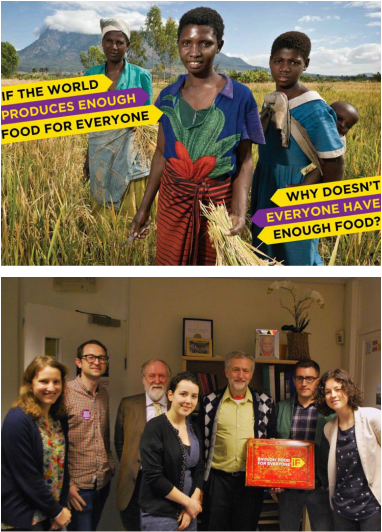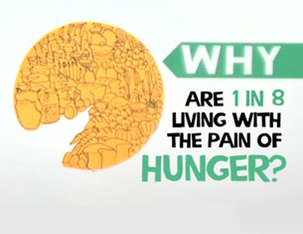 Izzy Braithwaite A few weeks ago, I went to an Enough Food IF training day, organised by a number of the big organisations behind the campaign. It aimed to give us the background needed to visit our MPs to talk about two of the main asks – aid and tax – in advance of the Budget and the Finance Bill. The question the IF campaign asks is ‘IF we produce enough food to feed everyone, why do one in 8 people go hungry?’ The crux of the argument is that IF we can change a number of key things about our current system, we can make sure everyone gets enough to eat. I couldn't really argue with that, and I decided I wanted to meet my MP about it - which I did as part of a group on Friday afternoon, and really enjoyed. How is the campaign linked to climate and health? I’ve been interested in global health for several years, focusing more recently on how climate change affects, and will affect, global health, which is how I got involved in Healthy Planet. It seems to me that one of the big impacts climate change is having on people in the poorest countries – and one of the biggest effects it’s likely to have on health in the future - is through food. It makes a lot of sense to me that IF we can build a fairer food system, including through changes in the way tax works for developing countries, that will help reduce the impact of climate-induced crop losses on the health of the poorest. Although the Enough Food IF campaign doesn’t focus explicitly on climate change, there’s a fair amount of evidence that land grabs, food price speculation and short-sighted biofuels policies – all of which the campaign aims to highlight and tackle – act alongside more unstable weather and inadequate social security to push more people into food insecurity. But even if it weren’t for climate change, we have massive injustices around food and access to it; climate change just exacerbates them. You can't really disagree that a world in which almost a billion who don’t have enough to eat while so many others throw away as much as they do, and while so many people are suffering the health effects of obesity, is kind of crazy. Tax and development I didn’t know a lot about the ins and outs of tax policy and how it related to international development before getting involved in the IF campaign, but came away from the training day and my reading online afterwards with a better understanding. I learnt how crucial tax revenue is in enabling developing countries to finance public services, and had no idea that tax avoidance currently costs them to the tune of 3 times as much revenue as they receive in aid each year. I was shocked to learn how Associated British Foods, which produces vast quantities of sugar in Zambia – a country where many people struggle to afford enough to eat – has managed to ensure that it pays less tax in Zambia than the woman in this ActionAid video, a shopkeeper who sells their sugar. Then there was the story about the Rwandan revenue authority, set up with a grant of £24 million from DfID, which now generates that much in tax every 3 weeks. Talk about value for money. That revenue stability enables the Rwandan government to finance essential public services like schools and healthcare, and helps it to ensure that it’s people have enough to eat. If we want aid to be effective and countries to be able to finance aspirations like Universal Health Coverage, tax should be a global health priority, and it was great to have some real examples to illustrate that at the meeting.  The meeting Alison Marshall, who works at Unicef UK and had signed up as a coordinator for my borough on the online lobbying forum, managed to set up a meeting with my MP Jeremy Corbyn for yesterday afternoon, and put everyone who’d expressed an interest in touch with the other interested people in Islington North. About half of those on the email list were able to make it, with quite a range of ages, jobs and backgrounds. Most of us had never met one another before the meeting, so we divided up tasks and subjects in advance and turned up for a chat half an hour before. Unforeseen circumstances meant the office was unavailable that day so we had to relocate, but fortunately an incredible woman called Theresa had offered up the nearby Finsbury Park Community Centre for the meeting. She filled us in on what things are like in the ward, which is one of the most deprived in England, and it was sobering to hear some of the statistics and stories. I'd read a bit about Mr Corbyn’s voting record and past involvement in international development-related work, so I had thought he would probably be happy to support the 0.7% aid goal, but I hadn’t known how he’d respond to the ask on tax transparency, which is a relatively technical one and took more explaining. It relates to the upcoming Finance Bill, and specifically asks that it extends DOTAS (disclosure of tax avoidance schemes) rules to any which impact on developing countries, in order to help them tackle tax avoidance by multinational corporations operating in their countries. The DOTAS regulations help tackle corporate tax avoidance in the UK, and it essentially requires companies to disclose any schemes they use to get out of paying tax. The IF ask (briefing here) is to introduce a similar requirement for UK companies and wealthy individuals to report their use of tax schemes with an impact on developing countries. It also asks that the bill require that when such schemes are identified the UK will use its existing powers under bilateral and multilateral treaties to notify developing countries’ tax authorities, and to assist in the recovery of that tax. Of course, transparency doesn’t in itself prevent tax avoidance, but it does make it much easier to hold companies accountable, and helps to enable developing countries to enforce and improve their laws. And of course UK action is not the whole of the answer – that will include international cooperation, which hopefully the G8 will make progress on, and country-by country reporting amongst other things. But it would be a good step on the road towards a fairer and more effective tax system, and could potentially set a useful precedent for other countries, and the EU, to follow. I quite like a challenge, so I’d kind of hoped we’d have to argue our case a bit more, but in fact he was very much in agreement with both of our asks, and agreed to write to the Chancellor and to lobby other Labour MPs and to raise it after the Budget and the Finance Bill. I suppose I can hardly complain that I have an MP who cares about international development and takes an interest in the details of how we should contribute to it even though most of his time is spent dealing with much more local issues. He told us about some of the problems he'd been trying to fix recently, such as the story of a guy who’d been sleeping on a bus for months who he’d just spent the afternoon trying to get re-housed. I hadn’t really thought there would be many parallels between politics and medicine before the meeting - not least because doctors tend to be trusted by the public whereas many politicians aren’t - but if I'd had to guess his job without knowing, I could easily have guessed a doctor or an overworked social worker. Both are both more of a lifestyle choice than a nine-to-five job, and both doctors and politicians have the opportunity to change peoples’ lives for the better.  Now is when the real test for the campaign begins - making sure there's enough pressure, and enough other MPs on board - to push through specific reforms. Which is where you come in... How can you get involved?
1 Comment
Izzy Braithwaite  It seems I've always liked food. At my 2nd birthday party, I sang 'Happy Cake' instead of 'Happy Birthday.' And I'd agree with George Bernard Shaw when he said, "there is no sincerer love than the love of food." But I'm now a bit more interested in some other questions about food than I was aged two... How could we provide food for 7+ billion people, in a warming world, in a way that doesn't destroy what remains of wild nature or further mess up our atmosphere? It's never possible to attribute a single event to climate change, but there's been a long-term trend of increasing frequency and severity of droughts recently. Last year, East Africa suffered the worst drought in 60 years, putting millions of lives at risk, and tens of thousands are believed to have died before aid arrived. As Amartya Sen pointed out in 1981, political and economic factors are often at least as important in famines as the food shortage itself: in Somalia it was greatly compounded by the activity of the Al-Shabaab rebel militia. Nonetheless, climate change is clearly (excuse the pun) starting to bite. This year droughts are also affecting India and the US, which is experiencing the worst drought in decades. There have been forest fires across Russia, Southern Europe and the USA, and a 25% rise in corn and wheat prices between just June and July. The rapid, record-breaking Arctic ice melt this year, and what it means for us, was described eloquently by George Monbiot: “what we are seeing, here and now, is the transformation of the atmospheric physics of this planet. Three weeks before the likely minimum, the melting of Arctic sea ice has already broken the record set in 2007. The daily rate of loss is now 50% higher than it was that year. The daily sense of loss – of the world we loved and knew – cannot be quantified so easily”. Although these changes seem to be happening even faster than predicted, we still cannot achieve a global emissions agreement. Meanwhile, funding for climate adaptation or biodiversity conservation in developing countries remain only a fraction of global spending on pet food, which totalled $80 billion in 2010. Subsidies, short-sightedness... and the biofuel boom Global agricutural subsidies contribute indirectly both to the conversion of natural habitats, to our increasingly unhealthy diets and to agricultural greenhouse gas emissions. Half a trillion dollars is spent annually by developed countries alone subsidising food production and processing, and the US's immense corn subsidies have been linked to the widespread use of unhealthy high-fructose corn syrup, and an increase in corn-fed over grass-fed cattle (producing much more methane). And in the EU, most of the €40 billion currently spent on direct agricultural subsidies goes to larger, wealthier farms, supporting intensive livestock farming and undercutting developing countries. It's not just on land that subsidies are a problem: the World Wildlife Foundation states that fishing subsidies create "a huge incentive to expand fishing fleets and overfish. Today's global fishing fleet is estimated to be up to two and a half times the capacity needed to sustainably fish the oceans. Even as stocks of valuable fish have shrunk, the size of the world's fishing fleets has exploded." Channelling tax money into fishing will only drive stocks nearer to the brink. Propping up a failing industry with subsidies is a bit like trying to get out of financial troubles by printing money. In the long run, it won't work. In view of the 0.8 billion people who go to bed hungry each night and the growing ranks of cars worldwide, current biofuel policies are a terrible idea. When grown on land that was previously forest or, worse still, peatland, they don't even help to combat climate change - the carbon released by clearing peat bog to grow palm oil takes over 1500 years to offset through reduced emissions, and about 75 years for tropical forest. As former World Bank president Ian Goldin put it, biofuel policies are "economically illiterate, environmentally destructive, politically short-sighted and ideologically unsound." Biofuels helped create the 2007-8 global food price spike and - alongside growing demand for beef, soy and palm oil - are a major reason for the conversion of tropical rainforest. The Food and Agriculture Organisation estimates that an area of primary forest approximately the size of Greece is lost per year (nearly 15000 hectares per hour). Some land is returned to forest each year, but secondary forest has much lower biodiversity and stores much less carbon than so-called 'old growth' forest. Some scientists believe that - unless we change course soon - most tropical rainforest could be gone within a decade. So how does this relate to my health? It's not all up to governments of course: the food we choose to buy is probably the second most important decision we make in terms of our environmental impact, after flying. It's certainly the biggest one most of us make regularly. Agriculture accounts for 17-32% of the world's carbon footprint, including deforestation, and much of this is associated with livestock. Food miles are often discussed, but cutting back on red meat and dairy is by far the biggest thing most of us could do to reduce our 'foodprint'. A 2006 UN report concluded that cows might be more damaging to the climate than trucks and cars combined - especially with worldwide beef and dairy production expected to double by 2040. Health could also benefit: Professor Ian Roberts argues that if we had to pay more for higher-carbon food, "healthy eating (would) become the easy option." Reducing food waste, currently estimated at around a third of all food produced globally, is a particularly easy win, simultaneously reducing land use, greenhouse gas emissions, landfill and saving money. We can also harness the potential of the internet to make more informed food choices. LandShare's 'FoodPrint' calculator lets you work out the land, water and fossil fuel required for any given diet, whilst 'Hugh's Fish Fight' is an i-Phone app with up-to-date information about sustainable fish. A more global, science-based perspective to our food choices would be useful too: opposing GM isn't going to help prevent billions from going hungry, and organic food, however well-meaning, may just contribute to the continuing expansion of cropland. To close yield gaps and reduce the conversion of pristine habitats, we need to train and support millions of small-scale farmers in developing countries to grow food sustainably and efficiently, and to help protect them from land grabs. "So long as you have food in your mouth, you have solved all questions for the time being" Does that mean we'll have to face food shortages ourselves before we start taking these problems seriously? Admittedly, Kafka was speaking from the perspective of a dog when he wrote this. But the problems with our food system won't solve themselves: and if we don't address, we may find ourselves in a much hotter, hungrier place. So what are the answers? Food - for the poor, and for the future - needs to be much higher on the political agenda. We need to allocate much more funding for research into higher yielding, more climate-resilient crops. Knowledge transfer to and empowerment of farmers in developing countries is also essential, but our consumption choices, especially regarding meat and waste, are at least as important - we need to start thinking of meat as a luxury, to reduce household food waste and to put pressure on food suppliers to do the same. Our food system isn't working - for us or for the planet - and it's up to all of us to fix it. Adapted from Izzy's blog on: http://www.huffingtonpost.co.uk/the-cambridge-union-society/food-glorious-food_1_b_1831066.html |
Details
Archives
February 2019
Tags
All
|
 RSS Feed
RSS Feed
